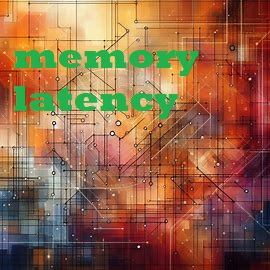Memory latency, also known as memory access time, refers to the time it takes for a computer to access data stored in memory. The effect of memory latency on the performance of a computer system is significant
1. Increased execution time: Memory latency causes delays in accessing data, leading to increased execution time for instructions and programs.
2. Reduced throughput: Memory latency limits the number of instructions that can be executed per unit of time, reducing system throughput.
3. Increased cache misses: Memory latency can lead to cache misses, which further degrade performance.
4. Decreased system responsiveness: High memory latency can cause delays in user interactions, making the system feel sluggish.
5. Bottleneck in memory-intensive workloads:
Memory latency becomes a significant bottleneck in workloads that require frequent memory access, such as scientific simulations, data analytics, and gaming.
6. Impact on multi-core processors: Memory latency can limit the scalability of multi-core processors, as cores wait for memory access.
7. Energy consumption: High memory latency can lead to increased energy consumption, as the system spends more time waiting for memory access.
To mitigate the effects of memory latency, computer architects and developers use techniques like:
1. Caching: Reduces memory access time by storing frequently used data in faster, smaller memory.
2. Pipelining: Overlaps memory access with instruction execution to hide latency.
3. Parallel processing: Executes multiple instructions simultaneously to reduce the impact of memory latency.
4. Memory hierarchy: Uses a combination of memory types (e.g., DRAM, SRAM, cache) to optimize access times.
5. Memory compression: Reduces memory access time by compressing data.
6. Prefetching: Anticipates memory access and prefetches data to reduce latency.
7. Optimized memory allocation: Minimizes memory fragmentation and optimizes memory allocation to reduce latency.




0 Comments